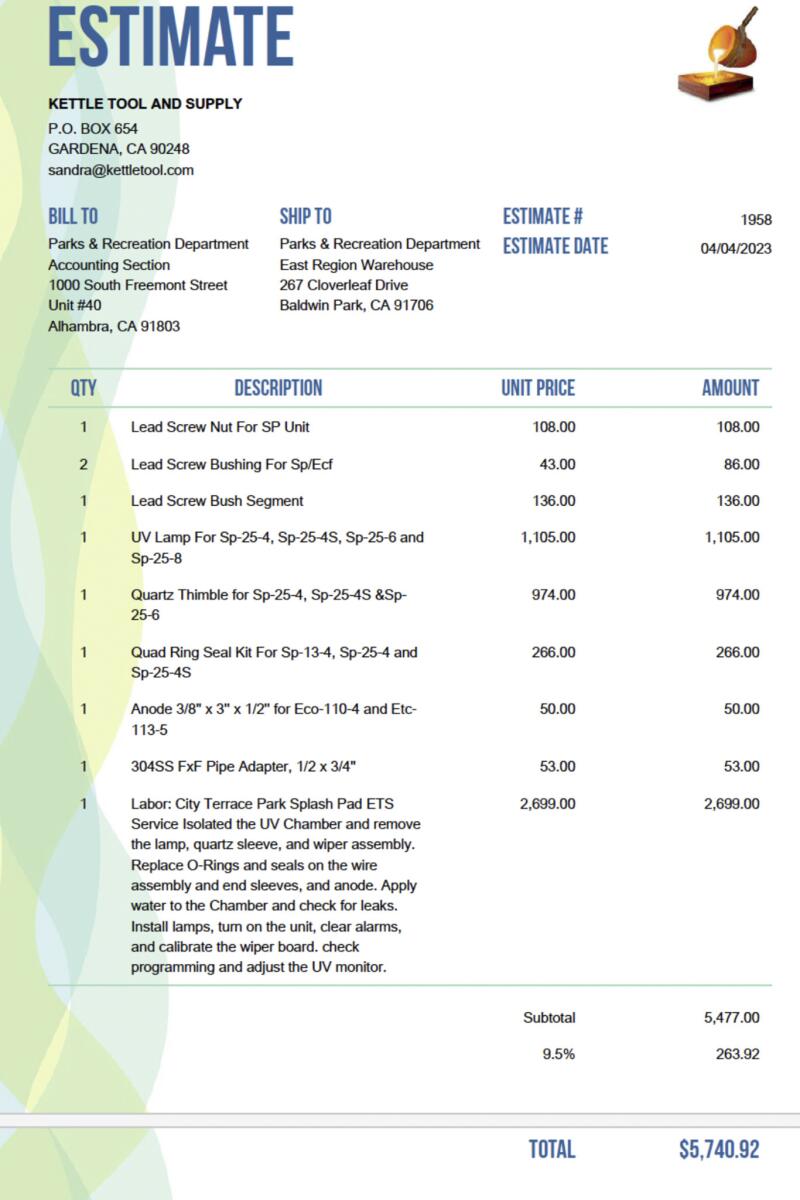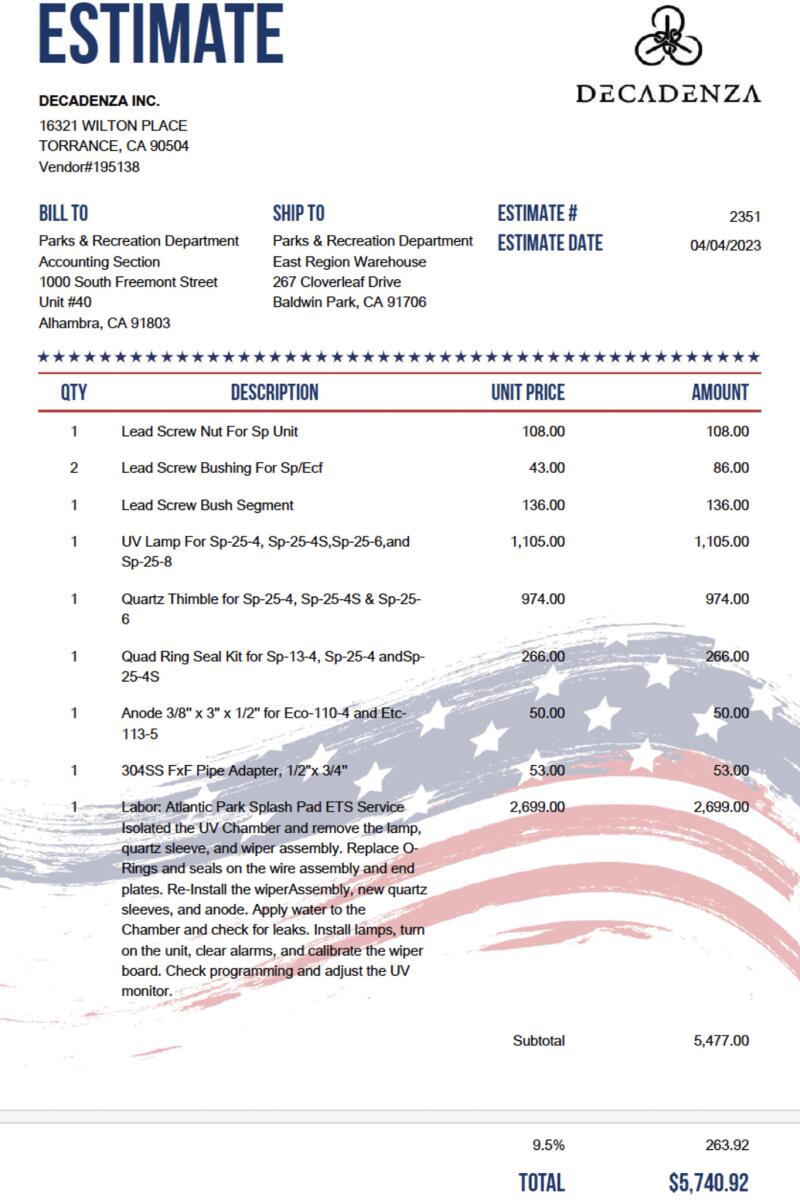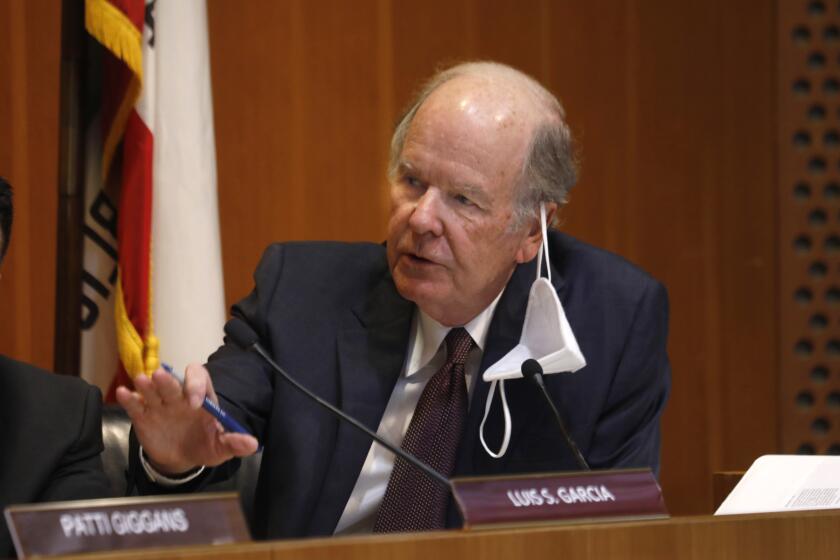
- Share via
David Payetta was on a years-long losing streak.
Metro-Chem Inc., the industrial supply company he launched in 2014, was hemorrhaging longtime customers. Decadenza Inc., a high-end luxury bag business he founded two years later, had floundered fast. In 2016, the Seal Beach entrepreneur filed for personal bankruptcy, saying in a court filing that he was more than $1 million in debt with monthly income that barely covered his mortgage.
A fraught divorce proceeding in Orange County — and the rotating cast of lawyers who went with it — pushed him deeper under what he would describe as a “tsunami of expenses.”
“It’s easy to see for a layman that I am in trouble financially,” Payetta wrote in an April 2019 divorce filing.
Payetta’s luck started to change last year. His companies began winning work nearly every month with Los Angeles County, buoyed by its Local Small Business Enterprise preference program — an initiative created to boost small, local firms in competition for county contracts.
But Payetta, 54, had an extra edge: In more than two dozen bids, he was competing exclusively against himself.
By early 2022, Payetta had filed with the California secretary of state‘s office to form three businesses: Decadenza, Metro-Chem, and Kettle Tool & Supply Corp. Each was certified by L.A. County’s Department of Consumer and Business Affairs as a “small business,” meaning they were local, independently owned companies with 100 or fewer employees.
Among other benefits, the certification gave them the chance to avoid competing against an open field of companies for certain contracts worth between $5,000 and $100,000. Instead, certified companies were able to bid against just one other small business.
Between March 2022 and March 2023, Payetta’s companies bid exclusively against one another at least 26 times, according to county procurement records obtained by The Times through a public records request.
All the contracts were awarded by the county Department of Parks and Recreation, which routinely asked Payetta’s companies to provide estimates for whatever supplies it needed — skateboard decks, karaoke systems, fragrance diffusers in exotic scents such as “heart throb” and “man cave.”
Because his companies were often the only ones competing, they effectively got to set the price for many of the goods the county wanted. For example, when the parks department wanted 34 karaoke systems in March, Metro-Chem sent in a bid pricing the systems at $750 each. Decadenza won by bidding them at $745 apiece. (The same brand of karaoke system is available online for $599.)
During this period, his businesses received more than $600,000 by bidding solely against one another, according to county records.

Subscribers get exclusive access to this story
We’re offering L.A. Times subscribers special access to our best journalism. Thank you for your support.
Explore more Subscriber Exclusive content.
The parks department did not respond to questions about why employees consistently sought bids from these three companies. Under county policy, procurement staff who select only two small businesses to bid are supposed to tap vendors “on a rotational basis.”
Chief Audit Executive Robert Campbell, who oversees internal fraud investigations for the county, said the three companies are now under “active investigation” after The Times’ inquiries. It marks the 13th investigation the office has opened in the last eight years into companies exploiting the small business preference program.

In a brief phone interview, Payetta said he owned only one of the three companies: Metro-Chem, which can supply “almost anything.” He said he filed paperwork with the secretary of state‘s office to create Decadenza in 2016 as a favor to a woman named Olivia, who was the daughter of a former employee. Similarly, he said he filed the paperwork for Kettle Tool & Supply in 2018 to help a woman named Sandra Smith. He said he never did anything for the companies after that.
But according to tax summaries provided by the California Franchise Tax Board, Payetta signed state tax returns for Decadenza and Kettle Tool as recently as September 2022, listing himself as president and chief executive. He did not respond to follow-up questions about the tax returns and other records linking him to the businesses.
“If you want anything from me for your story you can say that I am a very hard working and honorable man and that I can say the same for the men and women that I’ve met that work for the county,” he wrote in a text message after the phone call, adding that it seemed like “really boring stuff for a story.”
Sign up for This Evening's Big Stories
Catch up on the day with the 7 biggest L.A. Times stories in your inbox every weekday evening.
You may occasionally receive promotional content from the Los Angeles Times.
Jessica Tillipman, associate dean at the George Washington University Law School, said this appeared to be a brazen example of a common occurrence in her world: Companies trying to con small business preference programs. More startling, she said, was the fact that the county had failed to spot it.
“There are two explanations, and that is either just gross incompetence, or there’s somebody in on it,” said Tillipman, who specializes in government procurement fraud. “And that’s the only explanation.”
::
For more than two decades, L.A. County leaders promised to direct some of the billions of procurement dollars they spend every year to lift up small, local businesses.
But by 2016 they realized the push wasn’t working. The county was awarding more than $6 billion in contracts each year, and small businesses were still getting a sliver.
That year, county supervisors voted to dramatically expand the number of small, local firms they buy from, intent on giving a more diverse array of Angelenos a shot at lucrative awards.
“Small businesses, as has been said, is the engine of our local economy. We all know that and we all respect that,” Supervisor Hilda Solis, who co-wrote the motion, said at the time. “Our goal is to add even more power to that engine.”

By reducing competition for more small businesses, the county quadrupled the amount of money going to these companies for goods and services each year, from $113 million to more than $500 million, according to numbers provided by the county. But it also opened the door even wider for misuse.
“We have seen repeated abuses of the program and fraudulent activities by [certified small businesses], sometimes in coordination with county employees,” said a June 2020 report from the Office of County Investigations provided to the directors of the county’s Department of Consumer and Business Affairs and the Internal Services Department. “This had the effect of preventing legitimate … vendors from competing for and obtaining county business.”
Auditors recommended program changes to deter fraud, including requiring that companies disclose conflicts of interest and penalizing those who break the rules. The Department of Consumer and Business Affairs said it would make the fixes within three months.
But in a follow-up report released in May 2022 — nearly two years after auditors first sounded the alarm — the Office of County Investigations found the program leaders had not made a single change.
In that second report, investigators said they had uncovered three major fraud schemes connected to the small business program — at least two of them allegedly aided by county employees. In total, the county had spent more than $40 million on contracts with vendors “engaging in improper, conflicted, and fraudulent procurement schemes,” according to the report.
The Los Angeles County district attorney’s office has filed criminal charges against five people allegedly involved in these schemes; one pleaded guilty, the rest pleaded not guilty and are awaiting trial.
In 2019, county investigators accused two employees with the county’s Department of Health Services and Internal Services Department of steering work toward a company called Inline Valve Sales, a certified small business they believed existed solely as a “legal entity through which purchase transactions are laundered,” according to an internal investigation obtained through a public records request.
The two employees allegedly helped the company win county contracts for parts such as air filters or water feeders. Inline would then pay different companies to actually provide the county with the goods and charge the county heavily marked-up prices, according to the investigative report. In return, investigators said the business owner gave money and gifts to the two employees, including an off-road racing radio and parts for a motor home.
The district attorney’s office later charged one of the employees with embezzling public funds. He pleaded guilty to misdemeanor grand theft and was sentenced to one year’s probation. The owner of Inline Valve Sales was permanently barred from being a county vendor, but never charged. The company did not respond to a call and email requesting comment.
In a second case, law enforcement officers cornered Juan Ordorica, a longtime bridge maintenance supervisor for the county, as he started his workday on July 23, 2020, at the Department of Public Works’ yard in Downey.
After spending two years examining Ordorica’s bank statements, emails, Facebook posts and vacation photos, investigators accused Ordorica and his wife, a senior engineer with the same department, of directing county contracts worth millions of dollars to four “sham” companies, three of which were certified small businesses.
“These small vendor businesses, you know, they’re good — because they’re family-orientated,” Ordorica told the investigators, according to an interview transcript.
Despite being paid by the county to provide rental construction equipment, none of them owned any equipment for most of their time working with the county, and all four were operated by Ordorica’s nephew or longtime friends, the county alleged.
In return for steering contracts toward these shell companies, county investigators alleged that Ordorica had received kickbacks exceeding $1 million in the form of cash and mortgage and credit card payments — as well as World Series tickets worth $2,000.
The county later sued Ordorica, his wife, and the four vendors in an attempt to claw back $14.2 million in taxpayer money, which it said had been spent on two Redondo Beach homes, 22 vehicles and a small luxury watch collection. The lawsuit is ongoing.

In July 2022, the district attorney’s office charged Ordorica and three of the vendors in that case with felony embezzlement. They pleaded not guilty and are awaiting trial.
“We look forward to our opportunity to tell Mr. Ordorica’s side of the story within the court proceedings, and appreciate folks not rushing to judgment,” said Michael Schafler, Ordorica’s attorney, adding his client was a “highly regarded county employee” over his nearly three decades working for the county’s Department of Public Works.
The county is investigating a third alleged scheme stemming from the program, involving three vendors who had been paid more than $20 million, according to records provided by the Office of County Investigations.

::
For the last three years, the county’s small business preference program has been something of an orphan initiative, shuffled among three departments. The Department of Economic Opportunity, a new agency created to help local businesses, has been its home for the last year.
Kelly LoBianco, the department’s director, called the Local Small Business Enterprise — or LSBE — program a “game changer” with the power to give more Angelenos a crack at the billions of dollars of products and services the county needs each year. Defrauding it, she said, amounted to “an outrageous breach of public trust.”
“L.A. County is committed to thoroughly investigating all cases of alleged fraud or deception with our LSBE and other preference programs and ensuring that there are severe consequences for anyone who tries to cheat the system, including debarment for contractors, firing for any involved employees, civil litigation, and criminal prosecution,” she said in a statement. “Although the cases detailed by The Times represent only a small fraction of the contracts awarded to certified LSBEs last year, any instance of alleged fraud is one too many.”
Since receiving the program, LoBianco said staff have tried to bolster it against fraud, including conducting internal audits and “basic vetting” of the companies before certifying them.
But LoBianco said the bulk of vetting responsibility falls to other county departments once a vendor makes a bid: Internal Services, which supports departments with purchasing, along with whatever department awards the agreement.
In Payetta’s case, all departments missed red flags.
For example, a publicly available database of the county’s vendors showed that, at one point, all three companies had provided the county with Payetta’s email and phone number, prompting The Times’ initial public records request for all of their bids.
Payetta is listed as the sole “owner” of Kettle Tool in the internal vendor database used by the small business program. That database also lists Payetta’s email as one of the ways to contact Decadenza.
Metro-Chem, Decadenza and Kettle Tool all regularly submitted invoices to the parks department that included mailing addresses at the same Gardena post office.
The domain name for Kettle Tool — kettletool.com — was registered by a woman using Payetta’s home address, according to publicly available domain data.
And during a June visit to the locations that the three companies had listed as their principal addresses with the state, a reporter found only homes and a shuttered office.
Metro-Chem was at Payetta’s home on a quiet Seal Beach street. Decadenza was listed at a three-bedroom home in Torrance. And Kettle Tool was listed at a Baldwin Park office building in a suite with closed blinds and a black tarp covering the door.
Parked in the back was a white truck with the insignia used by Metro-Chem — a company Kettle Tool had bid against at least 20 times.
In a phone interview, Payetta said he has not played any role in Decadenza or Kettle Tool & Supply outside of filing the initial paperwork as a favor to get them started. “A lot of people don’t know the process,” Payetta said, adding that helping companies file these forms was “somewhat of a networking thing. ... I help them. I’m a nice guy.”
Payetta’s involvement appears to extend beyond assisting with the initial filings, according to court records and tax information provided by two other state agencies.
In addition to signing state tax returns for all three companies, Payetta is listed internally as the owner of the companies by the California Department of General Services, according to a public records request. The department said it uses tax records to verify the information. And in a 2019 divorce filing he wrote that he started Decadenza and was its “sole investor.”
“Decadenza was a good business idea,” he wrote. “I spent all of 2015 researching its viability before deciding to do it.”
Payetta did not respond to follow-up questions on the discrepancies.
According to emails released to The Times, Sandra Smith communicated with the county on behalf of Kettle Tool, and Isaac Jones on behalf of Decadenza.
Jones is listed as chief executive of Decadenza in the most recent filings with the secretary of state. Smith is listed as chief financial officer of Kettle Tool, and Payetta is listed as chief executive. Payetta said this might be the result of a “misfiling.”
Smith and Jones did not respond to calls or emails. The phone number listed in the county’s vendor database for Sandra Smith belongs to Sandra Recinos, the mother of Payetta’s child, according to a letter Recinos filed in his divorce case.
In April, both Decadenza and Kettle Tool emailed the county to submit bids on the same day, according to emails obtained through a record request.
“Dear Customer,” both emails began. “Please find the attached estimate. Thank you!”
The emails included attached estimates that were essentially identical — the PDFs were composed with the same font and layout, and contained identical descriptions of the goods at the same prices.


Two nearly identical estimates submitted by Decadenza and Kettle Tool to the county’s Department of Parks and Recreation. (Public Record)
Both said the hardware and services that the county was looking for would cost $5,740.92 — including a $108 screw nut.
A parks department spokesperson said neither company received the award, though the agency continued to tap the two companies to bid on orders through June.
“There’s certain fact patterns I can’t use in an exam because my students would get it too easily,” Tillipman, the procurement law expert, said after looking at the two estimates. “It’s a sign something very wrong is going on at that agency.”
More to Read
Sign up for Essential California
The most important California stories and recommendations in your inbox every morning.
You may occasionally receive promotional content from the Los Angeles Times.














